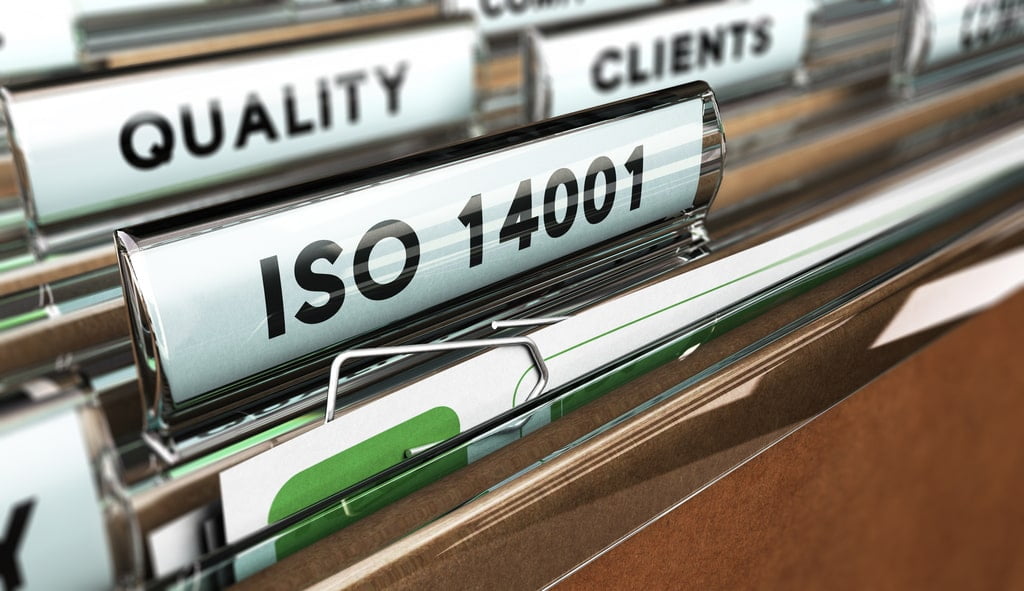
The ISO 14001 Standard is an international standard that sets the requirements for an effective environmental management system (EMS). Its goal is to help organisations improve their environmental performance through efficient resource use and waste reduction. This standard is essential for any company looking to minimise its environmental impact and comply with current environmental regulations.
ISO 14001 is part of the ISO 14000 family of standards, focused on environmental management. This standard provides a framework that organisations can follow to establish an effective environmental management system (EMS). ISO 14001 specifies the necessary requirements for an organisation to continually improve its environmental processes, thus ensuring a smaller ecological footprint.
The main purpose of ISO 14001 is to help companies comply with environmental laws and regulations, manage their environmental responsibilities systematically, and therefore contribute to sustainable development. Implementing an EMS according to ISO 14001 standards helps identify, control, and reduce negative environmental impacts.
Implementing the ISO 14001 standard has numerous benefits. For the WEEE (Waste Electrical and Electronic Equipment) and metal waste recycling sector, these benefits are even more significant. Below are some of the main benefits:
ISO 14001 drives organisations to continually assess and improve their processes. For companies dedicated to recycling ferrous and non-ferrous waste, this means optimising collection, classification, and recycling methods, thereby reducing environmental impact.
Environmental laws and regulations are increasingly strict. Having an EMS compliant with the ISO 14001 standard ensures that the company meets all current regulations, avoiding penalties and improving its reputation with authorities and the community.
An efficient EMS helps organisations identify opportunities to reduce resource and energy consumption, decrease waste generation, and optimise processes. This not only reduces environmental impact but can also generate significant operational cost savings.
Implementing the ISO 14001 standard demonstrates the company’s commitment to the environment. This can significantly improve the company’s image with customers, suppliers, and society in general, increasing trust and loyalty towards the brand.
The impact of ISO 14001 on the environment is significant. By providing a structured framework for managing and reducing environmental impacts, this standard helps organisations contribute tangibly to environmental protection. Some ways in which ISO 14001 benefits the environment include:
ISO 14001 promotes sustainable practices that include efficient use of resources such as water, energy, and raw materials. This is crucial for recycling companies of WEEE and metal waste, which can reduce the consumption of virgin resources through recycling and material reuse.
An EMS based on ISO 14001 helps identify and control sources of pollutant emissions, which is especially relevant for industries handling hazardous waste. Reducing emissions directly contributes to improved air quality and public health.
The standard promotes efficient waste management, minimising the amount of waste sent to landfills and encouraging reuse and recycling. This is fundamental for recycling companies, as it allows them to handle metal and electronic waste more effectively.
In the WEEE and metal waste recycling sector, ISO 14001 plays a crucial role. Implementing this standard can transform a company’s operations, making them more sustainable and efficient. Some ways ISO 14001 is applied in this industry include:
The standard requires continuous evaluation and improvement of processes, pushing companies to constantly seek ways to make their operations more efficient and less harmful to the environment. This may include adopting cleaner technologies and improving waste management practices.
Implementing an EMS according to ISO 14001 includes training staff in responsible environmental practices. This ensures that all employees are aware of their role in environmental protection and in the continuous improvement of the company’s environmental performance.
ISO 14001 requires organisations to establish systems to monitor and measure their environmental performance. This allows recycling companies to track their progress in reducing their environmental impact and make adjustments to their processes as necessary.
The ISO 14001 standard is an invaluable tool for any company seeking to improve its environmental performance and comply with current regulations. For the WEEE and metal waste recycling sector, implementing this standard not only helps protect the environment but also offers significant benefits in terms of operational efficiency and corporate reputation. At Erecycling, we are committed to adopting sustainable practices and continuously improving our processes to ensure a greener and healthier future for all.